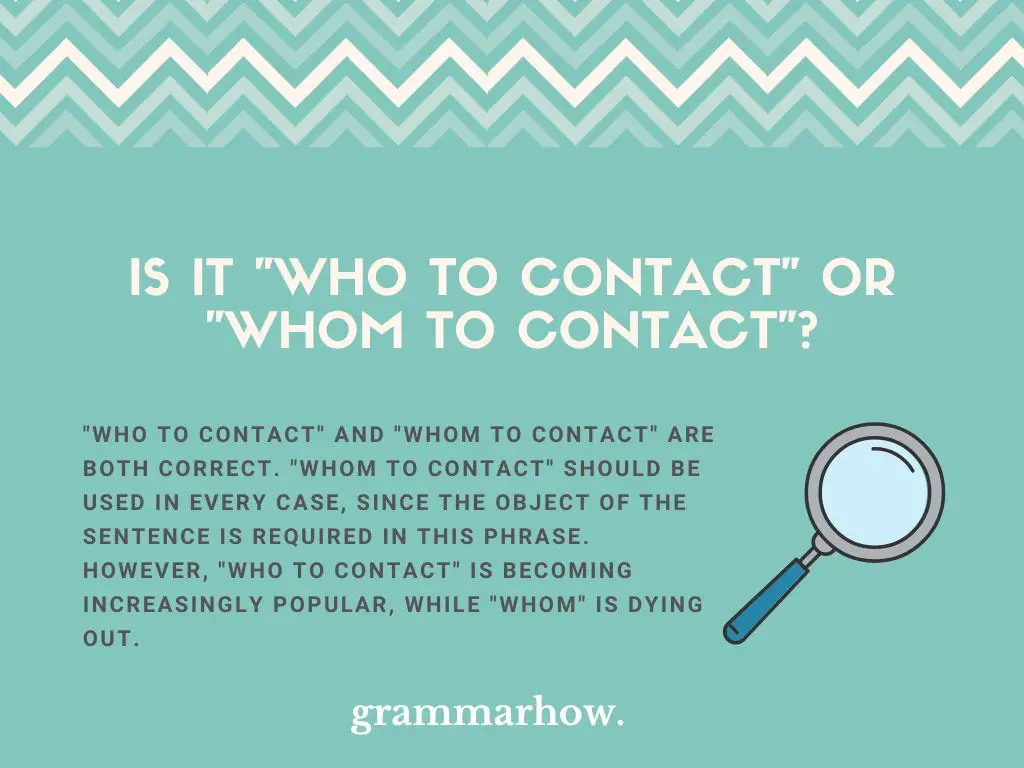“Who” and “whom” have overlapping meanings in many cases. This article will look into the ways “who to contact” and “whom to contact” differ. Hopefully, by the end of this, you’ll have a better understanding of which one is more suitable for your writing.
Is It “Who To Contact” or “Whom To Contact”?
“Who to contact” and “whom to contact” are both correct. “Whom to contact” should be used in every case, since the object of the sentence is required in this phrase. However, “who to contact” is becoming increasingly popular, while “whom” is dying out.

Native speakers use these phrases interchangeably. It’s possible to see both “who” and “whom” used. Typically, when someone uses one of the forms of “who,” they’ll stick to it throughout their writing rather than switching between the two.
It’s more common for “whom” to work with formal writing. It follows the original formal rules associated with using the object of the sentence in the correct part of the phrase. It’s like using object pronouns like “him” or “her.”
However, “who” is becoming more popular because people treat “whom” as an old-fashioned, pretentious word. It’s overly formal to many people’s ears, and most native speakers think it sounds quite jarring.
If you’re ever in doubt, you can’t go wrong with “who.” Most native speakers don’t even know what the key differences between “who” and “whom” are.
According to Google Ngram Viewer, “who to contact” is the more popular choice. Both phrases are used, but we can see that “who to contact” has become much more popular than “whom to contact” over the last few decades.

Who To Contact
“Who to contact” is the more informal choice that doesn’t stick to formal language rules. “Who” is slowly replacing “whom” in all aspects of the English language, and it’s becoming the choice that most native speakers stick to regardless of the sentence structure.
It’s possible to treat “who” as both the subject and object of the sentence today. It depends entirely on the context of the sentence as to which one is required at the time it’s written.
- I’m not going to tell you who to contact until you’ve calmed down. Your bad attitude won’t help anyone.
- I think you already know who to contact. I can’t keep reminding you of the name and number.
- Could you please tell me who to contact? I want to make sure I know what I’m talking about.
- And this is who to contact, right? I think I know what I need to say about this now.
Whom To Contact
“Whom to contact” is best when you’re writing formally, though even in those cases, most people prefer “who to contact” today. “Whom” is the object of the sentence, which we should use whenever an infinitive verb like “to contact” comes after it.
- Can you tell me whom to contact? I need to know so that I can get this issue resolved before it’s too late.
- I don’t know whom to contact here. I wish there was a more obvious way for me to get this done.
- She told me whom to contact, but I wasn’t really listening. I feel really bad about that.
- I will let you know whom to contact once I’ve found out myself. They have a register here with all the names.
Which To Contact
“Which to contact” is slightly different. It still uses a sentence object, but this time, “whom” becomes “which.” “Which” is a more general object. It allows us to refer to things and objects rather than people, which “whom” and “who” are strictly designed for.
- I don’t know which one to contact. Do you think you’ll be able to help me with this?
- Okay, but which is better to contact first? I want to make sure I get this right the first time.
- Which of these is better to contact? I think I should be the one to talk on the phone, to be honest.
- I will find out which to contact and get back to you. I’m sure one of these numbers is better than the others.
Final Thoughts
“Whom to contact” is technically the “most” correct form, but we use “who to contact” more often. “Whom” works best formally because it sticks to traditional written rules. “Who” works better informally because it’s started to take on the same meaning as “whom.”
You may also like:
Is It “Who Am I Speaking To” or “Whom Am I Speaking To”?
“Who Are You Waiting For” or “Whom Are You Waiting For”?
Is It “Who Do You Live With” or “Whom Do You Live With”?

Martin holds a Master’s degree in Finance and International Business. He has six years of experience in professional communication with clients, executives, and colleagues. Furthermore, he has teaching experience from Aarhus University. Martin has been featured as an expert in communication and teaching on Forbes and Shopify. Read more about Martin here.
